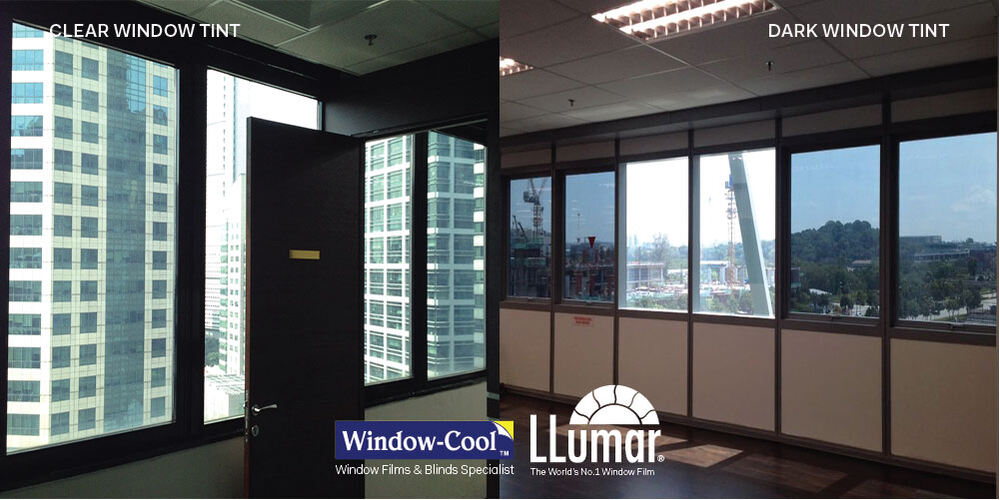
Clarity vs. Privacy
Choosing the Right Tint for Your Windows
Difference Between Clear Window Tint and Dark Window Tint
The clear and dark-tinted films are window films that can be used for various purposes, including reducing heat and glare, enhancing privacy, and improving the aesthetic appeal of a building or vehicle. However, they differ in terms of their level of tinting and their effects on visibility.
Clear window tint is a type of window film designed to reduce heat and glare without significantly altering the color or appearance of the glass. It is typically very light in tint, with a visible light transmission (VLT) of around 70% or higher. It’s ideal for the primary goal of reducing heat and glare while maintaining as much visibility as possible.
Dark window film, on the other hand, is a type of window film designed to significantly reduce the amount of visible light that passes through the glass, making it much darker and more opaque. It typically has a VLT of around 5-20%, depending on the specific product and application. The dark-tinted film is ideal for situations where privacy concerns or a darker, more dramatic look is desired.
The clear window film is best for those who want to reduce heat and glare while maintaining visibility, while the dark window film is best for those who want more privacy and a darker, more dramatic look. Ultimately, the choice between clear and dark-tinted films depends on the specific needs and preferences of the user.
Clear Window Tint or Dark Tinted Film for Home Windows

When choosing between clear window tint and dark tinted film for home windows, There are various things to consider, such as the film’s intended purpose, the aesthetic effect desired, and the impact on visibility.
A transparent window tint is a good option for homeowners who want to reduce heat and glare in their homes without significantly altering the appearance of their windows. This type of tint is ideal for windows that receive a lot of direct sunlight and can help to reduce energy costs by improving the efficiency of heating and cooling systems. Clear window tint also helps to protect furniture, carpets, and other household items from fading due to UV radiation.
On the other hand, a dark-tinted film is a good option for homeowners who prioritize privacy or want to create a more dramatic look for their windows. This type of tint can reduce visibility from the outside, making it difficult for people to see into the home while still allowing natural light to filter in. However, it is essential to note that dark-tinted film can make it more difficult to see out of the window, particularly at night.
Clear window tint is ideal for homeowners who want to reduce heat and glare while maintaining the appearance of their windows, while the dark tinted film is best for those who wish for increased privacy or a more dramatic look. In the end, the homeowner’s individual needs and preferences will choose whether to use clear or dark tinted film on their home windows.
Clear Window Tint or Dark Tinted Film for Car Windows

When choosing between clear window tint and dark tinted film for car windows, there are several factors to consider, including the film’s intended purpose, local regulations, and the impact on visibility.
A transparent window tint is a good option for car owners who want to reduce heat and glare while maintaining good visibility. This type of tint can help reduce the amount of sunlight entering the car, making driving more comfortable and allowing the driver to see clearly. Clear window tint can also help to protect the car’s interior from fading due to UV radiation.
Dark On the other hand, dark-tinted film is a good option for car owners who prioritize privacy or want to reduce the amount of sunlight entering the car. However, it is essential to note that local regulations may limit the darkness of tint allowed on car windows, and drivers may face legal consequences if they violate these regulations. Also, a dark-tinted film can make it more difficult to see out of the car, particularly at night.
Clear window tint is ideal for car owners who want to reduce heat and glare while maintaining good visibility. At the same time, the dark-tinted film is best for those who prioritize privacy or wish to limit the amount of sunlight that enters the vehicle. However, it is important to research local regulations and consider the impact on visibility before installing tinted film on car windows.
